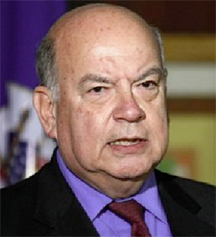Secretary General of the Organisation of American States (OAS) José Miguel Insulza is yet again calling on Guyana’s Parliament to get the AML/CFT (Amendment) Bill passed.
The call was made via a press release posted on the organisation’s website on May 2. The release said Insulza noted that the legislation has been under consideration for several months, and that “passage of this Act is crucial to bring the country up to standard on these matters.”
Insulza also noted that several of Guyana’s sister Caricom countries have successfully passed the legislation to become compliant with Caribbean Financial Action Task Force (CFATF) recommendations. CFATF is the regional regulatory body which seeks to ensure the enactment of strong laws against money laundering and the financing of terrorism.

Guyana has missed several deadlines, the latest of which was a deadline last November, by which it was supposed to pass the bill. CFATF members went as far as to coming to Guyana recently to personally warn local politicians of the ramifications of not passing the legislation by a CFATF plenary on May 29.
Members of both the opposition parties and government have shared with the public the grim picture painted by the CFATF Officials. Caricom has also called for the timely passage of the legislation, noting that Guyana’s failure to be found compliant during the upcoming plenary can have negative repercussions for Guyana and those countries tied to it.
Insulza first called for the legislation to be passed back in February, a few days before the Financial Action Task Force (FATF) was slated to hold its plenary; he is once again reaching out to Guyana.
He has even offered Guyana the assistance of the OAS’s Inter-American Drug Abuse Control Commission (CICAD), with whose recommendations, he said, Guyana’s draft law is consistent. The same offer was made in February.
As has been stated though, the issues preventing the passing of the bill are not technical, but political. A Partnership for National Unity (APNU) has said that its support for the bill will follow the president’s agreement to a framework to sign bills he has refused to give his assent to. The Alliance for Change (AFC) on the other hand, require the setting up of the Public Procure-ment Commission (PPC).
Government only needs one of the opposition parties to vote with it to get the bill passed, but the AFC says it wants government to favourably consider APNU’s demands, in addition to its own. However, President Donald Ramotar and Attorney General Anil Nandlall have said that the bills in question were refused because of their unconstitutional nature, and this has not changed.
Government has also said it will only support the setting up of the PPC if Cabinet is allowed to maintain its no-objection powers in the procurement process. The AFC as well as APNU refused to support this request.
Meantime, the select committee charged with considering the bill has completed its scrutiny of the amendments proposed by APNU, and Chief Parliamentary Counsel Cecil Dhurjon is currently working to make the changes that were effected during the last meeting. During its next meeting the committee will move to consider the AG’s counterproposal to the opposition’s amendments.
A date has not yet been set for the committee’s next meeting.





